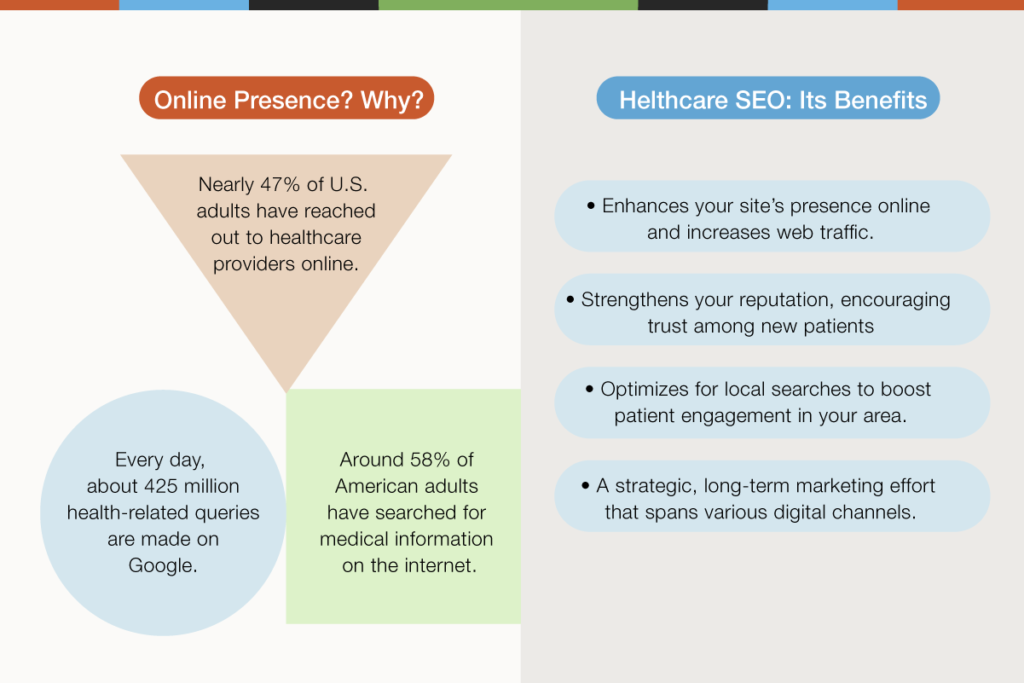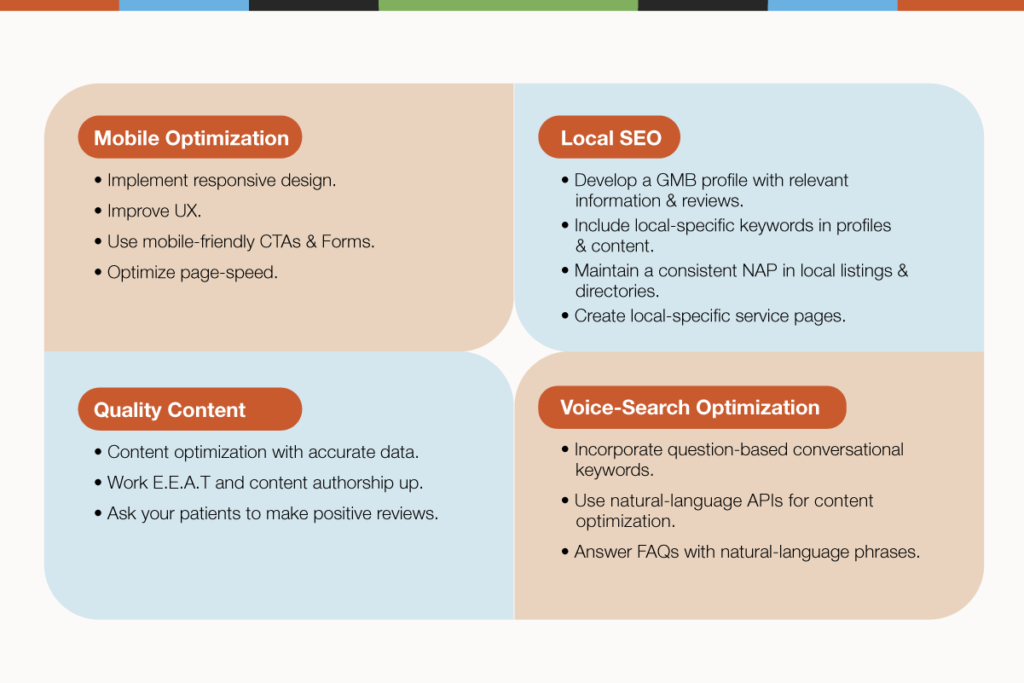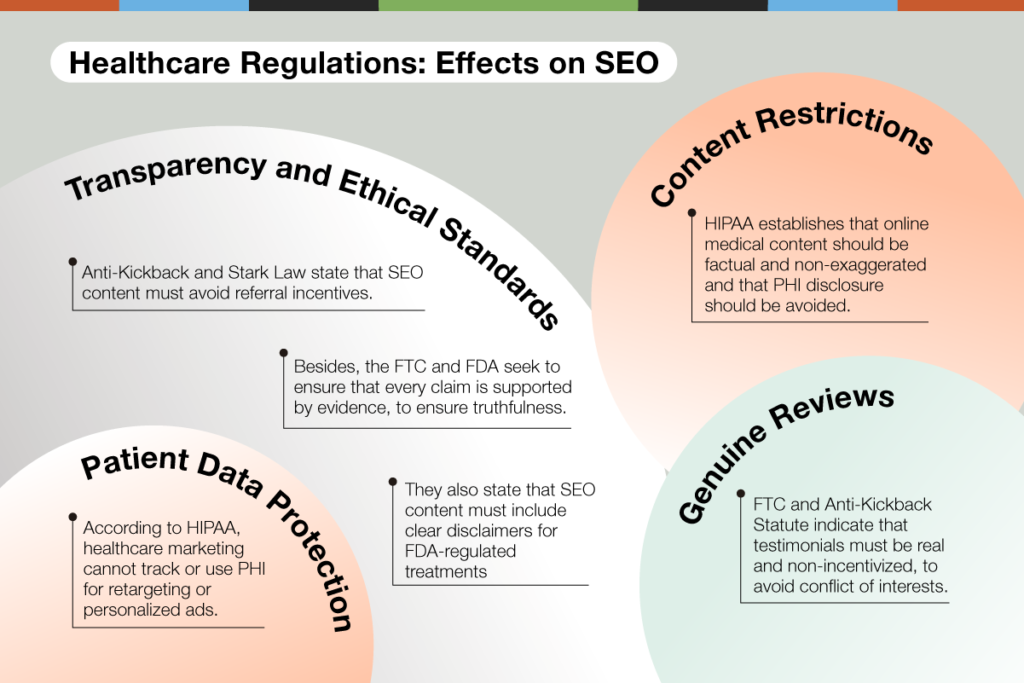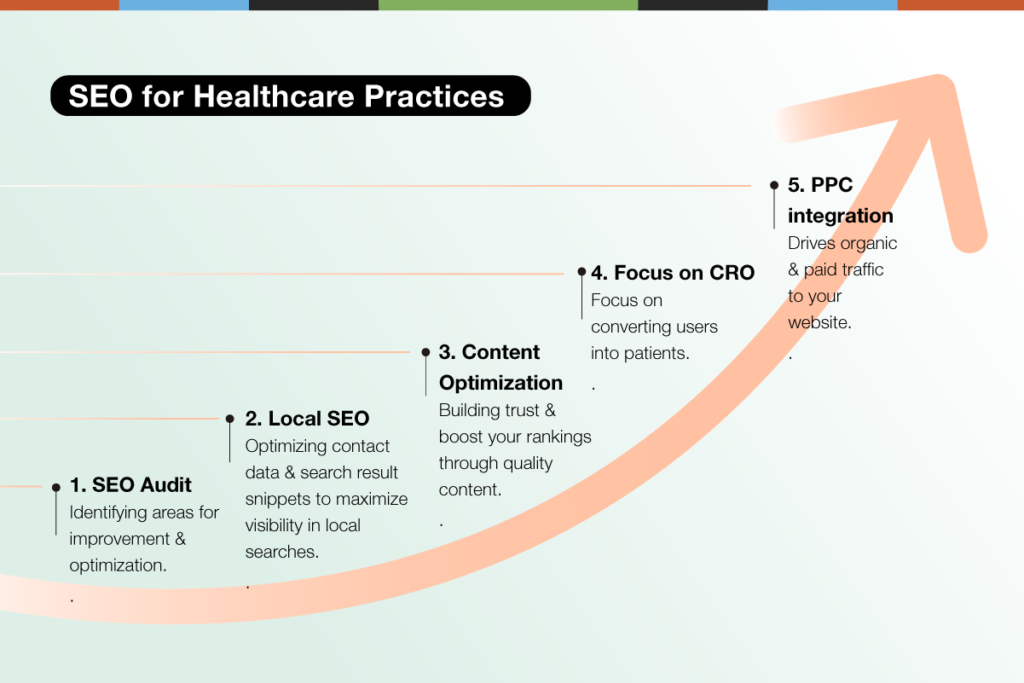Nowadays, having a stellar medical practice isn’t enough—you need to ensure potential patients can find you easily. But we live in a digital era, so you have to be easy to find on the web.
By optimizing your website and online presence, Healthcare SEO helps you rise through the ranks of search engine results, attracting more patients and boosting your practice’s visibility. In short, it’s the key to ensuring your practice isn’t lost in the vast digital landscape, directing search engines to your website or profile data.
In this post, we’ll guide you through Medical SEO, sharing what we have learned over the years. After all, at MD, we’ve helped many clients in the health industry, from big clinics to beginner practitioners, and can speak from first-hand experience.
Our SEO services proved to be game-changing, for healthcare providers aiming to reach a wider audience and to grow the credibility needed to build long-lasting relationships with patients.
What Is Healthcare SEO and Why Is It Important?
As you may know, SEO is short for Search Engine Optimization. This practice encompasses different methods to improve a website’s online presence so that it is more likely to find it in the first results pages of search engines.
Mainly, SEO involves optimizing your website for relevant keywords and search terms to increase its visibility. Some strategies to achieve this are prioritizing user experience (UX), including clear call-to-action, and tracking key metrics that reflect both traffic and conversion goals.
SEO practices can also be applied to Social Media, e-commerce, and other digital channels, to upgrade your broader digital presence. This helps to increase visibility both within platforms and search engines.
More in detail, medical SEO covers the optimization of healthcare providers’ online channels. In turn, this leads to more website traffic, which can translate into more patient inquiries, appointment bookings, and practice growth—given, of course, that you work with a quality Healthcare SEO Agency that does not only care for website traffic but for converting users into clients.
The importance of Medical SEO stems from the shift in patient behavior to online search. Already in 2019, Google registered that 5% of all its searches were health-related. No significant changes in health-related query percentage have been disclosed, since. Given that in mid-2024 Google had an average daily search volume of 8.5 billion queries, this amounts to 425 million health-related searches each day.
Moreover, in 2023, a study from the National Center for Health Statistics disclosed that 58.5% of adults in the U.S. resorted to the Internet to search for health or medical information. Furthermore, 47.7% used it to communicate with a healthcare professional or their office.
As Claudio Heliborn, MD’s SEO-CEO, says “Simply put, there’s no better way to connect with potential patients than through the Internet. The key is finding the proper approach—and that’s where agencies like MD Marketing Digital prove indispensable.”
All in all, effective SEO strategies position your medical practice as a trusted authority in your field. This enhances your reputation and fosters trust among potential patients, making them more likely to choose your practice for their healthcare needs.

Essential Healthcare SEO Strategies
Medical SEO is aimed at a specific audience and seeks to fulfill particular goals. Therefore, some SEO strategies that may not be relevant in other work fields are, here, of greater importance.
Local searches, mobile optimization, authoritativeness, and accessibility are key points when choosing a healthcare provider on the Internet. Let’s see why implementing these SEO strategies is a must, and how can you do it.
Optimizing Website for Mobile
Over the last couple of years, searches on mobile phones have increased exponentially. In particular, more than 70% of health-related queries are made using a mobile device.
On the one hand, this is due to a general increase in mobile search that has led Google to prioritize mobile-friendly versions of websites in its rankings. As a result, sites that aren’t optimized for mobile devices now rank lower in search results.
On the other hand, many health-related queries happen in emergencies, where smartphones—rather than computers—are typically within reach. Being able to access crucial information without loading or design issues makes a difference in these moments.
Consequently, mobile website optimization is a must for healthcare providers seeking to gain online visibility (and patients). In MD we make sure that you are up to date on this. Our key strategies include:
- Using a responsive design that adapts to the screen sizes of the device a user’s on, for better accessibility. To achieve this without having a website design degree, you can use CCS frameworks such as Bootstrap and Foundation.
- Mobile-friendly CTA’s & forms, that are easy to click and feature auto-fill options, and are visible (front and center, if possible). You can use both Typeform and the Gravity Forms WordPress plugin to create them.
- Improving UX, by simplifying navigation and optimizing the site’s design for mobile users. You can know more about how this is done, by reading our guide on User Experience design.
- Having a website with optimized speed helps to reduce bounce rates and strengthens UX. To enhance loading speed, you can optimize images, enable browser caching, and improve your site overall.
Local SEO for Healthcare Providers
Local SEO optimization ensures that your practice is easy to find by people in your area. By optimizing your online presence for geographic-specific searches, you can attract nearby individuals seeking medical care, thus increasing patient acquisition.
Users who make local searches often have a more definite search intent and are more likely to become patients. While someone searching for “cancer symptoms” is not necessarily looking for professional assistance, someone who searches “oncologist in Baltimore” definitely is.
Medical urgencies are a major source of local healthcare queries. In an emergency, people aren’t going to their regular doctor—they’re looking for the best and closest option. Showing up in local search results helps position you as that top choice, for internet users in your area.
In brief: Local SEO is another must for healthcare websites trying to rank in online searches. Some adjustments you can make to improve your local visibility online are:
- Creating a Google My Business (GMB) profile. This way, users will easily access information that any soon-to-be patient needs when searching for healthcare providers locally. Optimized GMB profiles usually include a practice’s address, name, phone number, the practitioner’s work hours, a website link, and high-quality images.
- Using local-specific keywords. Integrate location-based keywords that are relevant to your specialty into your site’s titles, page content, and meta descriptions. If, for example, you are a Maryland-based oncologist, make sure your website states it. Writing pieces of content specific to your location (like where to make blood analysis in Columbia) is an effective way to attract more local searches to your site.
- Building consistent NAP. This does not only apply to local listings (like your GMB profile) but also to healthcare directories. By maintaining NAP (Name, Address, Phone) consistency you are providing valuable data about where you can be found, both to users and search engines. Therefore, it will be easier for you to rank in local searches.
- Featuring location-specific service pages. It is advisable to have dedicated pages for specific locations if your practice can be found in several locations or has multiple branches offering certain services. Each page should detail the address, services provided, and hours. Besides, it has to include location-based keywords to ensure it ranks for particular local searches.
- Reviews. A key element of local SEO strategies is showcasing authentic, positive reviews. People aren’t keen on gambling with their health when visiting an unknown healthcare provider. Genuine reviews are one of the best ways to reassure potential patients about your professionalism and quality of care.
Building Authority Through Quality Content
Due to Google’s Algorithm updates, featuring high-quality content has become essential for ranking in search-result pages nowadays. It’s not just about creating trustworthy and well-written content—it also needs to address the user’s search intent. Optimizing your site’s pages with this approach helps you attract both users and search engines.
On the other hand, authenticity is also key in healthcare SEO. That’s where E.E.A.T. comes into play. Short for Experience, Expertise, Authoritativeness, and Trustworthiness, E.E.A.T. is Google’s evaluation of your website’s quality, a comprehensive checklist that scrutinizes every aspect of your site’s overall digital credibility.
Logically, a site with a good Google reputation has a better chance of ranking for keyword-specific queries than a site with a poor reputation. Besides, building trust with your audience isn’t just good for SEO –it’s good for business.
So, how do we, and how can you, foster authority by working up a site’s content and E.E.A.T?
- First, we make sure that every posted piece of content features accurate data about health topics a prospective patient may find useful. In other words, engaging pieces that align with Google’s specifications for helpful and people-first content.
- Another step we take is establishing the content’s authorship. Including an author bio-page or bylines helps to establish its credibility. Specially, when attributed to a medical expert whose expertise is certified. That is, when content is, at least, supervised by a trusted professional: you.
- Also, we incorporate compelling testimonials from satisfied clients to build trust and credibility. Earnest reviews have a significant role when it comes to enhancing (or destroying) a website’s reputation. Positive reviews are taken as a vote of confidence by Google (not to mention users) and influence, thus, page ranking for related queries.
Optimizing for Voice Search in Healthcare
Each day voice searches are becoming more and more popular. In healthcare fields, though, that is not its only other purpose, for it helps to ensure better accessibility to medical websites.
When optimizing a site for voice searches you must take into account that queries may be phrased differently, not only because of the choice of words and the speaker’s accent, but also because of grammatical particularities.
Using APIs like Google’s Cloud Natural Language and Text Razor can help you to achieve better results. However, other strategies for voice search optimization are:
- Include question-based conversational keywords. Try to rank for phrases such as “Where to find an oncologist in Baltimore” instead of just for short-tail keywords, like “oncologist in Baltimore”.
- Address frequent questions using phrases that copy natural language questions. A good idea is seeking to answer what, why, who, where, and when inquiries. This will help you reach such question-based voice searches.

Major U.S. Medical Regulations: What You Need to Know for a “Healthy” Medical SEO Campaign
In the USA, healthcare marketing is subject to several regulations designed to guarantee privacy to patients, ensure accurate information, and promote cultural sensibility. When developing a Healthcare SEO campaign, it’s essential to comply with them.
Failing to do so can lead to penalties ranging from denial of payments and required refunds to civil fines and exclusion from federal healthcare programs. When noncompliance with these regulations results in criminal violations, imprisonment may also be a consequence.
Sanctions vary depending on the offense and how it intersects with state-specific laws. For a deeper understanding of these rules, visit the websites of healthcare or legal institutes.
Those restrictions impact different aspects of healthcare SEO strategies. Mainly, the following ones:
- Content restrictions. Protected Health Information (PHI) is strictly off-limits in SEO to safeguard patient privacy. Additionally, all claims must be factual, avoiding exaggerations or vague language. While pushing boundaries often works in SEO cases, Healthcare SEO is a different story. Straying too far from established views on health topics usually doesn’t help when it comes to search rankings.
- Genuine reviews. Regulations specify that reviews on a healthcare provider should be non-incentivized, to avoid conflict of interest. Besides, Google’s algorithm penalizes reviews that seem “unnatural” by deleting them.
- Ethical and transparency standards. Legal restrictions seek to make sure that FDA-regulated treatments include disclaimers, and that every statement that is made is supported by concrete evidence.
Major medical SEO regulations include HIPAA, Stark Law, Anti-Kickback Status, FDA Advertising Regulations, and FTC Truth in Advertising. Before starting to plan your Healthcare SEO campaign, let’s review what each of them implies.
HIPAA (Health Insurance Portability and Accountability Act)
Health Insurance Portability and Accountability Act (HIPPA) seeks to protect patients’ privacy. According to this regulation, PHI can only be shared in specific instances, such as payment, healthcare operations, and treatments, and when it is in the Public interest.
If patients explicitly authorize it, PHI can be used for other purposes, such as research or marketing. Nonetheless, to implement such data in your healthcare SEO strategies, you must consider that:
- PHI encompasses a patient’s name, medical condition, treatment, and other identifiable data. Therefore, a medical website’s content should refrain from sharing it unless it is anonymized or the patient explicitly consents to it.
- HIPAA also establishes that ads and cookies are not to be used in ways that collect PHI. To avoid accidental HIPAA violations you can configure tools like Google Analytics to opt patient-identifiable data out.
Stark Law (Physician Self-Referral Law)
The Stark Law, also known as the Physician Self-Referral Law, restraints healthcare providers from referring patients and internet users to entities with which they are financially connected.
Stark Law aims to prevent conflict of interest and transparency in healthcare marketing, guaranteeing quality medical attention. You should take into account that it applies even in paid promotions and affiliate arrangements.
To put it simply: When making medical SEO you can, for example, write an article about choosing a lab. However, you can’t use that article to recommend, explicitly or implicitly, any lab you have a financial interest in.
Anti-Kickback Statute (AKS)
Referrals are also regulated by the Anti-Kickback Statute (AKS). This prohibits offering, soliciting, or accepting any form of remuneration in exchange for referrals of services that are covered by federal healthcare programs.
Hence, AKS affects healthcare SEO by:
- Restricting incentivized marketing, since healthcare providers are not allowed to remunerate positive reviews or patient referrals when services paid for by Medicaid and Medicare are involved.
- Demanding affiliate and referral arrangements to be non-incentivized and serve solely informational purposes. This means healthcare SEO strategies cannot involve direct referrals to practices, but should focus on creating informational content that attracts patients “naturally”.
FDA Advertising Regulations
FDA regulates healthcare advertising, marketing strategies, and medical SEO within them. FDA Regulations state that statements about medical devices, treatments, or drugs in advertising have to be supported by evidence and include disclaimers about side effects.
This implies that, when creating SEO pieces, copywriters and healthcare professionals need to avoid overstatements and stick to scientifically accurate language. Content needs to comply with FDA guidelines and inform not only about a treatment’s benefits but also about its risks.
In other words, the focus should not be on promoting a product or service, but on providing users with reliable, detailed information.
FTC (Federal Trade Commission) Truth in Advertising
In compliance with the previous restrictions, FTC Truth in Advertising requires healthcare marketing to be based on scientific evidence. Reviews and endorsements must also be genuine. In brief: healthcare SEO content needs to be non-deceptive, avoid misleading language, and reflect real patient experiences.
FTC transparency in advertising aims to ensure that marketing pieces provide trustworthy, non-incentivized data. This empowers users to make informed decisions about their health care, reducing the happening of unethical marketing practices.

Why Medical SEO Services Are Essential for Your Healthcare Business
SEO has a vital role in all industries, especially healthcare. With most people choosing to search for clinics and make appointments online, digital marketing is a crucial tool for healthcare providers to connect with patients effectively.
Targeting local patients, establishing authority, improving your website’s UX, and, of course, boosting your visibility are proven ways of increasing patient acquisition and making your practice grow.
In SEO all the traffic you get is organic, meaning you don’t have to pay Google to show up in search results. Because of this, SEO typically offers a highly convenient ROI (return on investment), helping you make the most of your marketing budget—if done right, of course.
Healthcare SEO poses challenges, though, such as regulatory compliance (both institutional and search engines) and management of web development tools. Collaborating with an expert SEO agency helps you overcome them, ensuring your SEO strategies are fit for today’s digital world.
Furthermore, SEO requires consistent time and effort, which can be hard to manage unless you’re doing it professionally. Spending just an hour a week in front of your computer won’t cut it for running a successful SEO campaign.
To maximize SEO results you can combine it with other digital marketing strategies. However, this approach demands more time, expertise, and effort to manage effectively—making a partnership with a digital marketing agency an ideal choice.
Our Digital Clinic: SEO for Healthcare Practices
At MD Marketing Digital, we have a proven process in line for our Medical SEO practice. Although it can be fitted to each client, it usually involves the following stages:
1. SEO Audit
We begin by conducting a comprehensive SEO audit of your website. This involves analyzing various factors, including the current state of your social media profiles, website speed, and mobile responsiveness. Our goal is to identify areas for improvement and optimization to enhance your online visibility and user experience.
2. Local SEO Optimization
Our next focus is on local SEO optimization to ensure your practice appears prominently in local search results. We start by optimizing your contact information, making it easily accessible to users. Additionally, we tailor search result snippets to target your specific geographic region, maximizing your visibility to local patients.
3. Content Optimization
Content is king in the world of SEO, so we prioritize content optimization to attract and engage your target audience. We incorporate compelling testimonials from satisfied clients to build trust and credibility. Well-written and informative content not only resonates with users but also earns favor with search engines, boosting your rankings.
4. Conversion Rate Optimization (CRO)
Our SEO strategy isn’t just about driving traffic – it’s about converting that traffic into loyal patients. By optimizing your website for user experience, we ensure visitors are more likely to take action, such as filling out contact forms or booking appointments. This focus on conversion rate optimization (CRO) maximizes the impact of your SEO efforts.
5. Integration with PPC Campaigns
Finally, we recommend integrating your SEO efforts with pay-per-click (PPC) campaigns to accelerate results.
While SEO is a long-term strategy, PPC provides instant visibility and traffic. By leveraging both approaches simultaneously, you can achieve faster and more comprehensive results, driving both organic and paid traffic to your website.
The timeline for seeing results can vary, but in general, you can expect to see some initial improvements within a few weeks, such as improved search rankings and increased organic traffic.
However, significant results take longer to manifest fully. It’s essential to view Healthcare SEO as a long-term investment in your practice’s online visibility and reputation.

Feeling Invisible? Time to change it
Optimizing webpages for search engines, local queries, and UX is a means of boosting your online presence. Providing quality, compliant content, serves, on its part, to encourage users to solve their health issues by becoming your patients.
Healthcare SEO comprehensively covers all of this, aligning with both web and institutional regulations while applying best marketing practices to promote users’ conversion. Have you ever applied SEO strategies to your website or GMB profile? How was your experience with it? Tell us about it in the comments!
Haven’t applied Healthcare SEO to your website yet and are willing to do so? Boosting your online visibility starts with a click. For real, that’s all you need. We’ll take care of the rest.
At MD Marketing Digital, we combine expertise and innovation to deliver top-tier digital marketing services that cover every aspect of your online presence. Our approach is centered on achieving quality results through proven, high-quality methods.
We pride ourselves on partnering with a diverse range of clients across the healthcare industry. From solo practitioners to multi-specialty clinics, we’ve had the privilege of working with doctors, clinics, IVF specialists, treatment centers, and more. No matter the size or specialization of your practice, we’re here to help.
Contact us to schedule a consultation. We’ll go through your unique needs and challenges and work together to find the right digital tools to take your business to the next level.
- Best Email Marketing Agencies in Argentina: MD Ranking - April 14, 2025
- Top 10 Best Web Design and Development Agencies in Argentina - April 7, 2025
- MD Marketing Digital Ranking Research Methodology - February 7, 2025
¿Qué te pareció este artículo?
What do you think about this post?








Great healthcare SEO insights!
Doctors not optimizing their online presence are missing a golden opportunity to attract patients in this digital world.
Thank you, Chris! You’re absolutely right—an optimized online presence is crucial for doctors in today’s digital age. Patients increasingly rely on online searches to find healthcare providers and read reviews before making decisions.
Do you think most doctors fully grasp the importance of SEO for their practice, or is it still an underutilized strategy in your opinion?